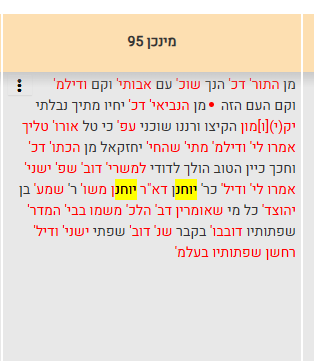There’s a famous saying about quoting people when relating their positions. כׇּל הָאוֹמֵר דָּבָר בְּשֵׁם אוֹמְרוֹ מֵבִיא גְּאוּלָּה לָעוֹלָם, “Whoever reports a saying in the name of he who said it brings redemption to the world.” It’s obviously a favored saying on this Substack, where I discuss who said what, which bears on how Sages relate to each other as well as in understanding the halacha.
My father likes to point out that everybody quotes the saying, but no one quotes who said it. :)
Here is one sugya where the idea is cited, Megillah 15a:
וְאָמַר רַבִּי אֶלְעָזָר אָמַר רַבִּי חֲנִינָא: כׇּל הָאוֹמֵר דָּבָר בְּשֵׁם אוֹמְרוֹ מֵבִיא גְּאוּלָּה לָעוֹלָם, שֶׁנֶּאֱמַר: ״וַתֹּאמֶר אֶסְתֵּר לַמֶּלֶךְ בְּשֵׁם מׇרְדֳּכָי״.
And Rabbi Elazar further said that Rabbi Ḥanina said: Whoever reports a saying in the name of he who said it brings redemption to the world. As it is stated with respect to the incident of Bigthan and Teresh: “And Esther reported it to the king in the name of Mordecai” (Esther 2:22), and this eventually brought redemption, as Mordecai was later rewarded for saving the king’s life, paving the way for the miraculous salvation.
So it is Rabbi Eleazar ben Pedat quoting Rabbi Chanina (, and based on actions and repercussions of Esther reporting to the king in Mordechai’s name).
In a recent daf, Sanhedrin 90b, we have a similar quote from Rabbi Yochanan:
מִן הַכְּתוּבִים, דִּכְתִיב: ״וְחִכֵּךְ כְּיֵין הַטּוֹב הוֹלֵךְ לְדוֹדִי לְמֵישָׁרִים דּוֹבֵב שִׂפְתֵי יְשָׁנִים״. וְדִילְמָא רַחוֹשֵׁי מְרַחֲשָׁן שִׂפְוָותֵיהּ בְּעָלְמָא? כְּרַבִּי יוֹחָנָן, דְּאָמַר רַבִּי יוֹחָנָן מִשּׁוּם רַבִּי שִׁמְעוֹן בֶּן יְהוֹצָדָק: כׇּל מִי שֶׁנֶּאֶמְרָה הֲלָכָה בִּשְׁמוֹ בְּעוֹלָם הַזֶּה, שִׂפְתוֹתָיו דּוֹבְבוֹת בַּקֶּבֶר, שֶׁנֶּאֱמַר: ״דּוֹבֵב שִׂפְתֵי יְשֵׁנִים״.
The proof from Writings is as it is written: “And your palate is like the best wine that glides down smoothly for my beloved, moving gently the lips of those that sleep” (Song of Songs 7:10), indicating that the dead will ultimately rise and speak. The heretics said to him: But perhaps merely their lips will move, in accordance with the opinion of Rabbi Yoḥanan, as Rabbi Yoḥanan says in the name of Rabbi Shimon ben Yehotzadak: Anyone in whose name a halakha is stated in this world, his lips move in the grave as if repeating the statement cited in his name, as it is stated: “Moving gently the lips of those that sleep.” No proof may be cited from that verse, as it is unrelated to resurrection.
Do we similarly quote Rabbi Yochanan for this idea, or Rabbi Yochanan citing Rabbi Shimon ben Yehotzadak?
If we do, what’s slightly funny about it is that the attribution is slightly unclear. Does Rabbi Yochanan quote Rabbi Shimon ben Yehotzadak? Or does Rabbi Yochanan quote Rabbi Shimon ben Yochai?
Printings have Yehotzadak, as does Munich 95:
But, Yad HaRav Herzog manuscript (copied from the earliest known original, but actual writing in 16th century) has Rabbi Shimon ben Yochai.
Lectio difficilior suggests to me that Yehotzadak, the rarer Sage, is original. Also, there is an instance of Rabbi Yochanan quoting Rabbi Shimon ben Yochai a bit below, so there can be a sort of dittography influence in play copying the Yochai earlier. In any case, there is a transitional form of Yo’ which could be condensed and then expanded.
The practical difference between the two would be scholastic generation. Say that this Rabbi Shimon ben Yehotzadak is a transitional Tanna/Amora, or else the possible #2, a younger contemporary of Rabbi Yochanan. Then, he’s just giving credit. If it is fifth-generation Tanna Rabbi Shimon ben Yochai, then the latter’s lips are moving in the grave as Rabbi Yochanan recites the statement.






Thank you!